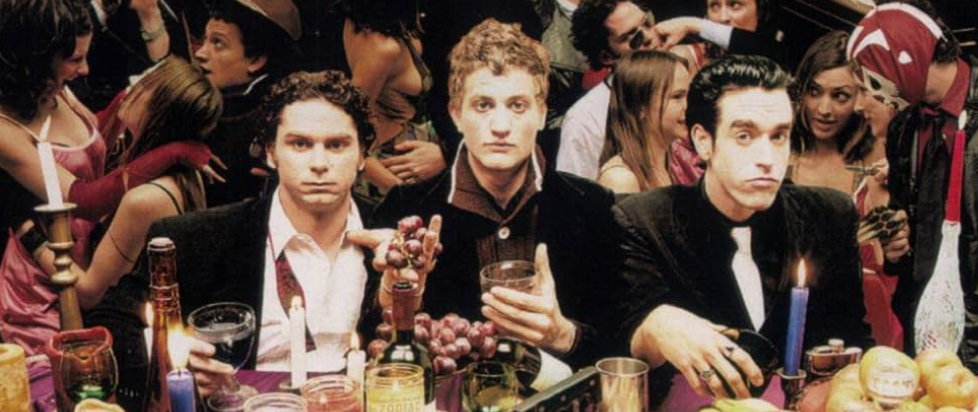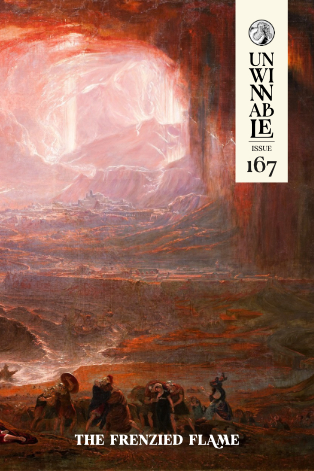
Indeed Forever

This column is a reprint from Unwinnable Monthly #167. If you like what you see, grab the magazine for less than ten dollars, or subscribe and get all future magazines for half price.
———
Wide but shallow.
———
It’s hard for some to recall the days of musical genre dogma, rules chiseled deep and supposedly held since before the rosetta stone was cracked. But there was a time not too long after the Sex Pistols finished up their time as the original industry plants where punk was boys with guitars and nothing else. Of course this didn’t hold even from those early days, but most bands that broke away were edged out, pushed into regular Rock or New Wave or before long Alternative Rock. Thankfully the only people who cared about the rules were so charisma deficient that it was easy to sidestep them early and often on an interpersonal level, but the scenes held sway with such power, and music so much difficult to track down in a more nuanced way without the internet, that any oxygen to be used with sonically creative expansion was in short supply.
Real punks didn’t care though, and if you were alive then and lucky to have a bit of an open-minded scene, perhaps in the middle of the hungry and vast plains states, beggars couldn’t be dogmatic. Thus The VSS, born in Colorado and bred in California, became one of the first post-hardcore bands with weird keyboards and color-coordination and a homebrew stage lighting setup seemingly cut in shop class. Cryptic, tinged with nihilistic cyberpunk skepticism, built around raw meditative rhythms and singer Sonny Kays modem-soaked street-corner sermonizing, The VSS burned bright but was too far forward to maintain the momentum. With a few singles and an album on Lance Hahn from J Church’s Honey Bear Records (rest in peace to one the greatest in the game) that was it. If your favorite band was even a little bit weird, it’s likely The VSS was on regular rotation in their van.

While Kay went on to run his own label Gold Standard Labs, working with The Mars Volta and many others and establishing his own singular graphic design style, the rest of the band hunkered down and cracked open their musical third eye. First as SLAVES, then well-advisedly adjusting their final moniker to Pleasure Forever, keyboardist/vocalist Andrew Rothbard, guitarist Joshua Hughes and drummer David Clifford pivoted away from the circuit-bent atmospherics of The VSS and leaned harder into high weirdness, magick circle goth. Candles, altars, paeans to the cosmic and peeling away the dead skin of reality, Pleasure Forever again cut something fresh from the bones of punk without losing themselves in the theatre-kid treacle of cabaret core or acid-soaked psychedelic silliness. Serious, but without costumes, open to the unknown, but no prayers to the moon, Pleasure Forever embraces the weird and the unknown but the nihilism of The VSS is far too ingrained for them to go full cringe conspiracy nut.
The band dropped two records on Sub Pop before calling it a day back in the early 00’s, after a few years setting a high bar as the opening act for many of that era’s biggest noise-makers. I saw them more than a few times, keeping the lamp-level stage lighting and pomaded hair, trading between tickled keys and buzzed out riffs, surging and swinging through their Birthday Party and Bad Seeds energy. They put in their work, calling out from the street corners and locking down the groove and living in the pocket.
And after a little while, we just didn’t hear from Pleasure Forever anymore, like so many other bands the diminishing returns for smaller acts just whittled the willingness to suffer the indignities of touring down to nothing. They moved on, and we did as well. I for one realized I didn’t have their first album anymore, and tracked down a copy in a local store. It was a whole thing; they had it at the other store actually but were nice enough to ferry it over for me to pick up the next day. Huzzah I said, giving it a spin on the old turntable, and then filing it way next to their second album which I had picked up when it came out, as well as . . . another copy . . . of their first album . . . which apparently I had pandemic ordered and forgot about in the black hole haze of those days.

Fresh off the realization that I have reached that stage of record collecting where I can no longer trust my own immediate recall and am now buying great records a second time or more, Pleasure Forever quietly announced their return to action. Their “mini-album” (not quite an EP, not quite an LP) Distal just landed, with eight songs steeped in the same summoning circles and mask parties of yore. Each track feels just as layered and assembled as ever, but also willing to ride out a little further, pushing into the stars and the astral plane, licks and lines crawling between atoms, soundtracking the sinister and the unknown. These are not sunrise vibes unless you’re Deacon Frost hauling a true blood out for a little morning meditation, but neither does Pleasure Forever simply soak in raw darkness. To know peace one must know unrest, whether that’s dissonant chords or off-kilter harmonies that resolve themselves into the transcendent, the transformational synergies of the universe.
Distal is Pleasure Forever at their most refined. The lives they’ve lived since Altar to now have clearly informed their work, familiar without feeling reductive of themselves or their influences. You may not have even known you were missing Pleasure Forever but they’ve been here all along, and they always will be.
———
Levi Rubeck is a critic and poet currently living in the Boston area. Check his links at levirubeck.com.




